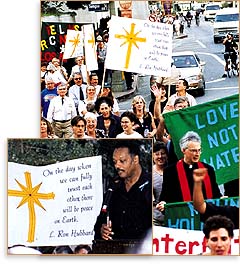
|


By Cat Tebar
Video project features Los Angeles event with Jesse Jackson to educate and serve as a model for broad-based, multi-faith response to hate crimes.

o one can deny that Los Angeles is a melting pot—a place where it is not only advisable but vital to work for unity, tolerance and equal access to opportunity.
That was the message communicated by the Reverend Jesse Jackson to a crowd of almost a thousand in Los Angeles in October 1999. His words drew a strong contrast to violent acts of hatred committed in Los Angeles in the previous year, such as violence against a Jewish Community Center and an Asian Los Angeles postal worker.
Seeking to bring an end to hate-based violence, diverse faith communities from throughout greater Los Angeles County joined with Rev. Jackson in a collective response culminating in the October Walk for Unity.
A project is now underway to preserve the historic walk. A Claremont-based nonprofit Christian organization, Mobilization for the Human Family, is preparing a half-hour video to be used as a visual aid in religious institutions and schools to address the issue of hate crimes. Richard Bunce, spokesperson for Mobilization, sees this as the first element in a visual aids curriculum to combat hate crime. Ernest Savage, independent producer on the project, plans to present the video work to the Mobilization group in mid-2000. The video is funded by Liberty Hill Foundation in Santa Monica through its Donors Advice Program in which projects are presented to investors for support.
Marching for Unity
The video will capture the spirit and message of the Walk for Unity, which began at Olvera Street, representing the Hispanic roots of the city, and finished at the U.S. Courthouse where perpetrators of violent acts are tried.
The walk was one of 500 anti-hate vigils which took place in American cities on the same day, all part of a joint national effort by two national anti-discrimination organizations, Fellowship for Reconciliation and the Interfaith Alliance, to help bring an end to hate crimes.
Rev. Gwynne Guibord, President of Mobilization for the Human Family and lead organizer of the multi-faith event, said, “The time has come for people of faith and good will to move from marching against hate to marching for unity. We are reclaiming our city and county from hate.”
California Assemblyman Gil Cedillo delivered a greeting to kick off the march, followed by words of inspiration from leaders of the Muslim, Buddhist, Jewish and Christian communities. And presaging what he would tell them when they reconvened before the U.S. Courthouse, Rev. Jesse Jackson led the marchers in a chant to “keep hope alive” which continued to resound through the downtown streets as the group made its way past City Hall South to the courthouse on Spring Street. The crowd continued to swell as workers left their offices and joined the walk, which approached 1,000 participants by the time the speakers’ platform was reached.
Speeches were heard from Los Angeles County Supervisor Zev Yaroslavsky and Deputy District Attorney for Hate Crimes Carla Arranaga. A poignant message was delivered by the brother of Joseph Ileto, slain hate-crime victim.
The Role of the Faith Community
As the light faded at day’s end, Rev. Jackson concluded the events, giving voice to a broad mix of emotions as participants stood face-to-face with the Ileto family. The internationally acclaimed human rights leader eloquently defined the role of the religious community in ending hate crimes.
“We have diverse communities in a common struggle for equal access,” said Rev. Jackson. He pointed out that distrust abounds in our society and today more funds are invested in prisons than in schools. Further, the schools that we do have are not ensuring that children rise to their highest potential. “It is not surprising that more young men are entering jails than colleges these days,” he said.
Rev. Jackson also spoke of the responsibility shared by the faith community for easing the mutual fear or antagonism which can be incited between different segments of the population by bigotry and prejudice. He also stressed that the underlying cause for crimes of hate was despair and frustration with an unconfrontable future. But “when united by hope,” he said, “we can pool our might and create opportunities and a better union.”
Among the religious communities represented in the walk were the Southern California Ecumenical Council, San Fernando Valley Interfaith Council, Associated Student Body Campus Ministry, Mount St. Mary’s College, Temple Kol Tikvah, Universal Fellowship of Metropolitan Community Churches, Korean Resource Center, Ecumenical Council of Pasadena Area Churches, Unity-and-Diversity World Fellowhip, the Church of Scientology Western United States, California Council of Churches, and Rainbow/PUSH Coalition. Among local government leaders who showed their support for the Walk for Unity were Los Angeles County Supervisor Zev Yaroslavsky, L.A. City Council Members Michael Hernandez and Michael Feurer, and Deputy District Attorney Carla Arranaga (head of the Hate Crimes Division).
For more information on the Walk for Unity video, contact
Mobilization for the Human Family,
1325 N. College Ave.,
Claremont, CA 91711-3199.
|

|






